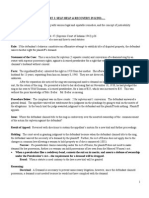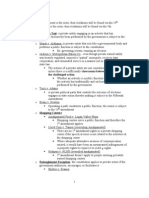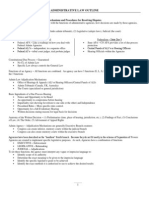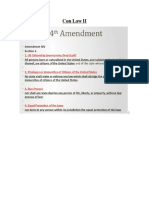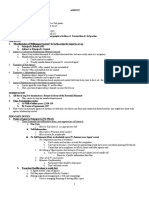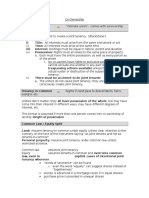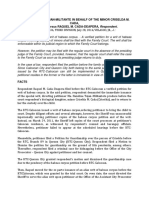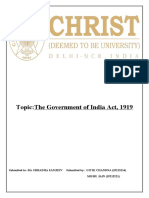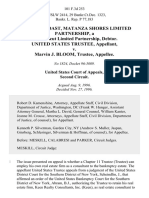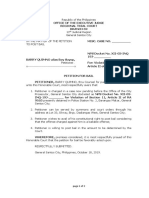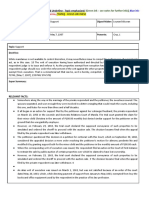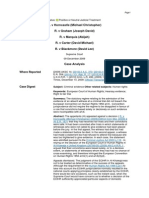Constitutional Law Outline
Constitutional Law Outline
Uploaded by
geoffpdxCopyright:
Available Formats
Constitutional Law Outline
Constitutional Law Outline
Uploaded by
geoffpdxCopyright
Available Formats
Share this document
Did you find this document useful?
Is this content inappropriate?
Copyright:
Available Formats
Constitutional Law Outline
Constitutional Law Outline
Uploaded by
geoffpdxCopyright:
Available Formats
Constitutional Law Outline THE FEDERAL JUDICIAL POWER A. Article III Federal govt. is a govt.
. of limited powers, federal action must be authorized. The Constitution authorizes govt. action. Questions of validity regarding an action by a govt. entity must be authorized by the Constitution. The Con. authorizes a federal court system in Art. III, which provides the fed. Courts have judicial power over all cases and controversies: 1. Arising under the Con, laws, or treaties of the US 2. Of admiralty or maritime jurisdiction 3. In which the US is a party 4. Between two or more states 5. Between a state and citizens of another state 6. Between citizens of different states 7. Between citizens of the same state claiming lands under grants of different states; and 8. Between a state or citizens thereof and foreign states, citizens, or objects 9. (In all other cases, the S.C. shall have appellate jurisdiction) B. Power of Judicial Review 1. Definition: The authority of the courts to review decisions, actions, of omissions committed by another agency or branch of govt. 2. Con does not explicitly state that the Supreme Court may determine the constitutionality of acts of other branches of govt. 3. However, judicial review of the branches was established in Marbury v. Madison; the Con is law and it is the province and duty of the judiciary to declare what the law is. a. Marbury v. Madison i. Facts: President Jeffersons Sect. of State, Madison(D), refused to deliver a commission granted to Marbury(P) by former President Adams. ii. Issue: Does the Constitution give the Supreme Court authority to review acts of Congress and declare them to be void (if repugnant to the Con.)? iii. Holding: Yes. The Supreme Court has the power, implied from Article VI, 2 of the Con. To review acts of Congress and declare them void. The govt. of the US is a govt. of laws, not of men. The president, bound by these laws, is given certain political powers by the Con, laws that he may use at his discretion. He is authorized to appoint officers to carry out his orders, whose acts as officers (the presidents acts) are NEVER subject to examination by the courts. However, where these officers are given by law specific duties on which individual rights depend, any individual injured by breach of such duty may resort to his countrys laws for a remedy. Marbury had the right to a commission, and Madisons refusal to deliver it violated that right. Clearly a case for mandamus. However, should the Supreme Court be the court to issue it? The Judiciary Act of 1789 established and authorized US courts to issue writs of mandamus to courts or persons holding office under U.S. authority. Secretary of State Madison (D) comes within this Act. Article III provides (within the Case and Controversy clause) that the Supreme Court shall have original jurisdiction in all cases affecting ambassadors,
public ministers and consuls, and where a state is a party. In all other cases, the Supreme Court shall have appellate jurisdiction. For the court to issue a mandamus, it must be an exercise of appellate jurisdiction. The grant of appellate jurisdiction is the power to revise and correct proceedings already instituted; it does not create the clause. To issue a writ of mandamus ordering an executive officer to deliver a paper is to create the original action for that paper. This would be an unconstitutional exercise of original jurisdiction beyond the power of the court. iv. Mandamus: is a judicial remedy which is in the form of an order from a superior court to any government subordinate court, corporation or public authority to do or forbear from doing some specific act which that body is obliged under law to do or refrain from doing, as the case may be, and which is in the nature of public duty and in certain cases of a statutory duty. 4. Separation of Powers: The system of checks and balances preventing one branch from infringing upon exercising the powers of another branch of govt. The Constitution separates govt. powers among the three branches (tripartite structure). This separation prevents legislature from interfering with courts final judgment. a. Plaut v. Spendthrift Farm Inc. Appeal from a judgment dismissing a motion to reinstate a previously dismissed class action for violation of federal securities law. i. Facts: After Congress amended the Securities Exchange Act, changing the limitations period established by case precedent and mandating reinstatement of cases dismissed as time barred, the district court denied Plauts (P) motion to reinstate the final judgment in his case on the ground that the amendment was unconstitutional. ii. Issue: May Congress retroactively command the federal courts to reopen final judgments without violating the Separation of Powers doctrine? iii. No. Congress may not retroactively command federal courts to reopen final judgments without violating the SoP doctrine. Article III establishes a judicial department with the province and duty to say what the law is in particular cases and controversies. History shows that the Framers (Madison, Jefferson, Hamilton, etc) crafted this charter of the judicial department with an express understanding that it gives the federal judiciary the power not to merely rule on cases, but to decide them subject to review only by superior courts in the Article III hierarchy. b. United States v. Klein - Appeal of compensation awarded for property destroyed by the Union army during Civil War i. Facts: Klein was awarded compensation for property destroyed by the Union army because a presidential pardon he received presumptively showed that he had been loyal, loyalty being a condition of receiving such an award. On appeal, he challenged a congressional enactment that directed federal courts to find that a pardon was proof of disloyalty and that denied the court jurisdiction over the claim.
ii. Issue: Does a statute violate the separation of powers by commanding a court to draw a certain conclusion from evidence before it and by directing the court to dismiss an appeal for lack of jurisdiction when it encounters such evidence? iii. Holding: Yes. This law does not regulate the courts appellate power as permitted by the Constitution. If the law simply denied the right of appeal in a certain class of cases, it would be constitutional. However, under the statute, the court does have jurisdiction up to the point where there is proof of a pardon. At that point, the statute requires the court to declare that its jurisdiction has ceased and to dismiss the case. iv. By attempting to dictate to the courts how they must decide, Congress has violated the separation of powers. This statute directs the court how to decide a case, and allows the legislative branch to dictate to the judicial branch rules of decision. In addition, the law also violates the SoP with regard to the executive branch by attempting to impair the effect of an executive pardon. c. Caution: When determining whether federal legislation impairs the finality of a decision of the US Supreme Court, scrutinize the facts. i. Ex: states have limited power to regulate interstate commerce, while the federal govt. has plenary power (separate, complete, absolute power) to do so. Thus, a decision that a state lacked the power to enact a particular regulation of commerce does not necessarily prevent Congress from adopting a regulation similar to the state regulation that was struck down. There is no interference with the finality of the Courts decision because of the difference in standards. 5. Federal Review of State Acts a. Federal review of state acts (executive, legislative, judicial) was established by the Marshall Court in a series of decisions. Clear basis exists here in the Supremacy Clause of Article VI, which states that the Constitution, Laws, and Treaties of the US take precedence over state laws and that the judges of the state courts must follow federal law, anything in the constitution or laws of any state to the contrary notwithstanding. [Fletcher v. Peck (1910)] C. Federal Courts two types of federal courts: Article III and Article I 1. Article III Courts a. Those courts established by Congress pursuant to the provisions of Article III, 1. Although Congress has plenary power to delineate the jurisdictional limits, both of original and appellate, of these courts, it is bound by the standards of judicial power set forth in Article III as to subject matter, parties, and the requirement of case and controversy. b. Congress cannot require these courts to render advisory opinions or perform administrative or nonjudicial functions. 2. Article I Courts a. Congress has created other courts by way of implementing its various legislative powers i. US Tax Court ii. Courts of the District of Columbia
b. Judges of Article I courts do not have life tenure or protection from salary decrease as Article III court judges. c. Administrative as well as judicial functions d. The congressional power to create hybrid courts has been sustained by the Supreme Court [Glidden v. Zdanok, (1962)] D. Jurisdiction of the Supreme Court 1. Original (trial) Jurisdiction under Article III, 2, the Supreme Court has original jurisdiction in all cases affecting Ambassadors, other public Ministers and Consuls, and those in which a State shall be a Party. a. This provision is self-executing: Congress may neither restrict nor enlarge the Supreme Courts original jurisdiction, but Congress may give concurrent jurisdiction to lower federal courts and has done so regarding all cases expect those btw states. 2. Appellate Jurisdiction - Article III, 2 further provides that in all other Cases before mentioned (i.e. arising under the Constitution, Act of Congress, or treaty), the Supreme Court shall have appellate jurisdiction, both as to Law and Fact, with such exceptions, and under such regulation as the Congress shall make a. Statutory Application of Appellate Jurisdiction Congress has provided 2 methods for invoking Supreme Court appellate jurisdiction i. Appeal jurisdiction is mandatory (very few cases fall within the Courts mandatory appeal jurisdiction, thus appellate jurisdiction is almost completely discretionary. ii. Certiorari where jurisdiction is within the Courts discretion 1. Writ of Certiorari the Supreme Court has complete discretion to hear cases that come to it by writ of certiorari. A case will be heard if four justices agree to hear it. The following cases may be heard by certiorari: a. Cases from the HIGHEST state courts where constitutionality of a federal statute, federal treaty, or state statute is called into question, or a state allegedly violates federal law; and b. All cases from federal courts of appeals 2. Appeal The Supreme Court must hear those few cases that come to it by appeal. Appeal is available only as to decisions made by three- judge federal district panels that grant of deny relief. b. Limitations on Statutory Regulation i. Ex Parte McCardle, 1868 has been read as giving Congress full power to regulate and limit the Supreme Courts appellate jurisdiction. However possible limitations on such congressional power have been suggested: ii. Facts: McCardle (D) appealed from a denial of habeas corpus to the Supreme Court, but Congress passed an act forbidding the Court jurisdiction. (vis-a-vi the Civil War Reconstruction Acts, imposing military govt. on many former confederate states by Congress post Civil War)
1. Habeas Corpus: a proceeding in which a defendant brings a writ to compel a judicial determination of whether he is lawfully being held in custody. iii. Issue: Does Congress have the power, under the Constitution, to make exceptions to the appellate jurisdiction of the Supreme Court? iv. Holding: Yes. Although the Supreme Court derives its appellate jurisdiction from the Constitution, the Constitution also gives Congress the express power to make exceptions to that appellate jurisdiction. The appellate jurisdiction of the Supreme Court is NOT derived from acts of Congress, but is conferred by the Constitution with such exceptions and regulations, as Congress shall make. v. McCardle is a clear example of judicial restraint. Congress may eliminate certain avenues for Supreme Court review as long as it does not eliminate all avenues. In McCardle, two statutes allowed the Supreme Court to grant habeas corpus to federal prisoners. The Supreme Court upheld the constitutionality of Congresss repeal of one of the statute because the other remained as an avenue for Supreme Court habeas corpus review 1. Although Congress may eliminate Supreme Court review of certain cases within the federal judicial power, it must permit jurisdiction to remain in SOME lower federal court 2. If Congress were to deny ALL Supreme Court review of an alleged violation of constitutional rights, or go even further and deny a hearing before any federal judge on such a claim, this would violate due process of law. E. Constitutional and Self-Imposed Limitations on Exercise of Federal Jurisdiction 1. No Advisory Opinions Supreme Courts interpretation of case and controversy requirement in Article III bars rendition of advisory opinions. a. Federal Courts will NOT render decisions in moot cases, collusive suits, or cases involving challenges to governmental legislation or policy whose enforcement is neither actual nor threatened. b. COMPARE Declaratory Judgments Fed Cts. can hear actions for D.J. i. Case or controversy will exist if there is an actual dispute btw parties having adverse legal interest ii. Complaints must show specific conduct and that the challenged action poses a real and immediate danger to their interests. iii. Fed Cts. will NOT determine the constitutionality of a statute if it has never been enforced and there is no real fear that is will be [Poe v. Ulman, (1961)] 2. Ripeness Immediate Threat of Harm a. A plaintiff generally is not entitled to review of a state law before it is enforced (i.e., may not obtain a declaratory judgment). b. Thus, a fed court will NOT hear a case unless the P has been harmed or there is an immediate threat of harm see [Poe v. Ulman, (1961)] 3. Mootness judgment on the particular issue has been previously decided or settled (flexible doctrine filled w/ exceptions).
a. A federal court will NOT hear a case that has become moot; a real, live, controversy must exist at ALL stages of review, not merely when the complaint was filed. [out of class ex: DeFunis v. Odegaard, (1974)] i. Dismissing a white student challenge to a states affirmative action program, since the student, although originally passed over during for a minority student with poorer grades, had been admitted to the school and was about to graduate by the time the case reached the Supreme Court, and would have received the same degree whether or not the AA program was invalidated. b. Exception Capable of Repetition but evading review i. Where there is a reasonable expectation that the same complaining party will be subjected to the same action again and would be unable to resolve the issue because of the short duration of the action, (where the controversy is capable of repetition yet evading review), the controversy will not be deemed moot. Examples: 1. Issue concerns events of short duration (pregnancy, elections, divorce actions); and 2. Def. voluntarily stops the offending practice, but is free to resume it. c. Class Actions A class representative may continue to pursue a class action even though controversy has become moot, as long as claims of the others in the class are still viable [United States Parole Commission v. Geraghty, (1980)] case brief: i. Rule: An action brought on behalf of a class does not become moot upon expiration of the named plaintiffs substantive claim, even though class certification has been denied. ii. Facts: Geraghty (P) brought suit challenging the validity of the U.S. Parole Release Guidelines on behalf of all federal prisoners eligible for parole. Class certification was denied and Geraghty (P) was released from prison while his appeal was pending. iii. Issue: Does an action brought on behalf of a class become moot upon expiration of the named plaintiffs substantive claim, even though class certification has been denied? iv. Holding: No. The controversy between the prisoners and the parole commission is still a live one and there can be a substitute for the named representative. d. Distinguishing - Ripeness from Mootness i. Related concepts in that the court will not hear a case unless there is a live controversy. 1. Ripeness bars consideration of claims BEFORE they have been developed, whereas; 2. Mootness bars their consideration AFTER they have been resolved. 4. Standing The right to commence suit against another party because of a personal stake in the resolution of the controversy. The Supreme Court will not decide a constitutional
challenge to a govt. action unless the person who is challenging the govt. action has standing to raise the const. issue. Components of Standing: a. Components of Standing: i. A Plaintiff will be able to show a sufficient stake in the controversy ONLY if he can show an Injury in Fact caused by the govt. that will be remedied by a decision in his favor (i.e., causation and redressability). ii. Injury: a person must be able to assert that he is injured by govt. action of that that the government has made a clear threat. Must allege Specific Injury, and it MUST be more than merely theoretical injury that all persons suffer by seeing their govt. engage in unconstitutional actions. 1. Injury can be economic OR impact physical well-being iii. Causation: there must be casual connection btw the injury & conduct complained of iv. Redressability: whether a ruling favorable to the litigant would eliminate the harm to him. If the harm wouldnt be eliminated, then that individual does not have the type of specific injury that would grant him standing to challenge govt. action. b. Common Standing Issues i. Congressional Conferral of Standing: Congress has no power to completely eliminate the case or controversy requirement, bc the req. is based in the const. ii. Zone of Interest P may bring suit to force govt. actors to conform their conduct to the req. of a specific statute. Must have an injury in fact. [ex: persons selling data services to private businesses, Comptroller of Currency ruling allows banks to make data processing service available, the interference causes an injury, (lost profit), and will be within the zone of interest protected by the fed. Statutes limited the authority of the Comptroller and national banks. iii. Assert the Rights of Others: P may assert 3rd party rights where be himself has suffered injury AND: 1. 3rd parties find it difficult to assert their own rights: a. NAACP v. Alabama, 1958 NAACP was permitted to assert freedom of association rights of its members in attacking a state law req. disclosure of membership lists bc its members could not file suit without disclosing their identities; or 2. The injury suffered by the P adversely affects his relationship with the 3rd parties: a. Craig v. Boren, 1976 beer vendor was granted standing to assert the constitutional rights of males under 21 in attacking a state law prohibiting sale of beer to them, but NOT to females under 21- which resulted in an indirect violation of their rights. 3. Limitations on Asserting Rights of Others: Family Law Issues a. [Elk Grove Unified School Dist. v. Newdow] A parent with uncertain custody LACKS standing to sue in fed ct on
behalf of his child. Domestic relations questions are wholly reserved to the states. In Newdow, divorced father lacked standing to bring claim bc mother had full custody, including decisions regarding education. iv. 5. 6. 7. 8. Adequate and Independent Grounds Abstention Political Questions 11th Amendment Limits on Federal Courts
II. LEGISLATIVE POWER A. Enumerated and Implied Powers 1. Necessary and Proper power a. Dfdf i.
You might also like
- Federal Jurisdiction FlowchartDocument1 pageFederal Jurisdiction FlowchartLeidy Johanna100% (1)
- Elements OutlineDocument153 pagesElements OutlineAaron WarnerNo ratings yet
- Short Con Law OutlineDocument7 pagesShort Con Law OutlineShadi MahmoudiNo ratings yet
- 1S CivPDocument1 page1S CivPac70119No ratings yet
- Administrative Law Outline 12-17-10Document33 pagesAdministrative Law Outline 12-17-10Andrea ChairesNo ratings yet
- Revisiting Asbestos Plaintiff and Fact Witness DepositionsDocument4 pagesRevisiting Asbestos Plaintiff and Fact Witness DepositionsJim DedmanNo ratings yet
- Professional Responsibility OUtlineDocument6 pagesProfessional Responsibility OUtlinelaura_armstrong_1067% (3)
- Tanganyika Legislative Council Order in Council 1926 PDFDocument9 pagesTanganyika Legislative Council Order in Council 1926 PDFMkinga100% (1)
- Constitutional Law 1 Outline Frohman LADocument27 pagesConstitutional Law 1 Outline Frohman LAcsungrl09No ratings yet
- Con Law OutlineDocument18 pagesCon Law OutlineJane MullisNo ratings yet
- The Great Stern Con Law 1 OutlineDocument71 pagesThe Great Stern Con Law 1 OutlineBrenda RomanNo ratings yet
- Summary: The Constitution in Exile: Review and Analysis of Andrew P. Napolitano's BookFrom EverandSummary: The Constitution in Exile: Review and Analysis of Andrew P. Napolitano's BookRating: 5 out of 5 stars5/5 (1)
- Public Function Test - A Private Entity Engaging in An Activity That HasDocument24 pagesPublic Function Test - A Private Entity Engaging in An Activity That HasNate Enzo100% (1)
- WillsDocument72 pagesWillsJohnNo ratings yet
- The Justiciability Doctrines: Case or ControversyDocument4 pagesThe Justiciability Doctrines: Case or ControversyApple ObiasNo ratings yet
- Con Law 2 OutlineDocument47 pagesCon Law 2 OutlineSean DomnickNo ratings yet
- Administrative Law OutlineDocument20 pagesAdministrative Law OutlineChristopher Nicolaysen100% (3)
- Torts OutlineDocument35 pagesTorts OutlinelearninghandNo ratings yet
- Administrative Law Case ReviewDocument73 pagesAdministrative Law Case ReviewthriftydigNo ratings yet
- Chapter 6 NotesDocument4 pagesChapter 6 NotesNana Mireku-BoatengNo ratings yet
- Corporations OutlineDocument48 pagesCorporations OutlineNegotiator101No ratings yet
- Business Associations Outline I. Entity Forms 1. S P O ODocument29 pagesBusiness Associations Outline I. Entity Forms 1. S P O OMattie ParkerNo ratings yet
- Remedies For Breach of Contract: 1. DamagesDocument5 pagesRemedies For Breach of Contract: 1. DamagesSachinNo ratings yet
- Property Attack OutlineDocument9 pagesProperty Attack OutlineAshley MeredithNo ratings yet
- Civil Procedure - Outline - Prof. Hughes: Heading Page # 1 ... 1 ... 5 5Document24 pagesCivil Procedure - Outline - Prof. Hughes: Heading Page # 1 ... 1 ... 5 5Mona GoraNo ratings yet
- Con Law Oultine-PersonalDocument5 pagesCon Law Oultine-PersonalAshley DanielleNo ratings yet
- Constitutional LawDocument141 pagesConstitutional LawJohnNo ratings yet
- Constitutional Law OutlineDocument41 pagesConstitutional Law OutlineLaura Skaar100% (1)
- III. Civil Procedure (Part 2) : Wednesday, 7 October 2020 12:19 AmDocument13 pagesIII. Civil Procedure (Part 2) : Wednesday, 7 October 2020 12:19 AmMarc Lester ChicanoNo ratings yet
- Admin Quiz PrepDocument3 pagesAdmin Quiz PrepCasey MillerNo ratings yet
- Con Law OutlineDocument72 pagesCon Law OutlineAdam DippelNo ratings yet
- Habeas Corpus AnalysisDocument6 pagesHabeas Corpus AnalysisLazinessPerSeNo ratings yet
- Personal. Jurisdiction Attack OutlineDocument11 pagesPersonal. Jurisdiction Attack OutlineKasem AhmedNo ratings yet
- Admin LawDocument49 pagesAdmin LawIlliana Parker100% (1)
- 2020.05.05 - (108) Memorandum Decision and OrderDocument13 pages2020.05.05 - (108) Memorandum Decision and OrdermikekvolpeNo ratings yet
- University of Tennessee Law Profs Send A Letter To Sens Alexander and BlackburnDocument5 pagesUniversity of Tennessee Law Profs Send A Letter To Sens Alexander and BlackburnStar News Digital MediaNo ratings yet
- Con Law II PPT OutlineDocument76 pagesCon Law II PPT OutlineNija Anise BastfieldNo ratings yet
- Civil Procedure OutlineDocument25 pagesCivil Procedure OutlineElNo ratings yet
- Individual FMLADocument11 pagesIndividual FMLAMatthew Seth SarelsonNo ratings yet
- Civ Pro Outline TextDocument22 pagesCiv Pro Outline TextMelissa PortesNo ratings yet
- Law ChartDocument2 pagesLaw ChartTharu BuddhikaNo ratings yet
- BA OutlineDocument40 pagesBA OutlineChristopher HendersonNo ratings yet
- Admin OutlineDocument5 pagesAdmin Outlineflipscb100% (1)
- Business Association OutlineDocument134 pagesBusiness Association OutlineSean BarlowNo ratings yet
- Business Associations OutlineDocument50 pagesBusiness Associations OutlinemasskonfuzionNo ratings yet
- Civil Procedure OutlineDocument10 pagesCivil Procedure OutlineMichael CantorNo ratings yet
- Property MapDocument26 pagesProperty Mapanar beheheheNo ratings yet
- LH Admin Attack OutlineDocument9 pagesLH Admin Attack OutlineDave Leslie100% (1)
- Constitutional LawDocument44 pagesConstitutional LawidownloadbooksforstuNo ratings yet
- Criminal Law OutlineDocument17 pagesCriminal Law OutlineNathan A. PrinceNo ratings yet
- Civil-Procedure Outline Greiner BlueberryDocument55 pagesCivil-Procedure Outline Greiner BlueberryIsaac GelbfishNo ratings yet
- Con Law Issue ChecklistDocument1 pageCon Law Issue ChecklistAtticus FinchNo ratings yet
- Judicial Deference To Administrative Agencies and Its LimitsDocument16 pagesJudicial Deference To Administrative Agencies and Its Limitsthebt1No ratings yet
- Con Law II Outline-2Document13 pagesCon Law II Outline-2Nija Anise Bastfield100% (1)
- Dministrative AW Utline: I. D A SDocument45 pagesDministrative AW Utline: I. D A Snak75No ratings yet
- Statutory Law Outline - NKDocument78 pagesStatutory Law Outline - NKrsheth2100% (1)
- Civil Procedure OutlineDocument9 pagesCivil Procedure OutlineGordon K. SattroNo ratings yet
- Civil Procedure OutlineDocument33 pagesCivil Procedure Outlinekevincapital100% (1)
- CivPro Outline MartinDocument80 pagesCivPro Outline MartinVince DePalmaNo ratings yet
- BA I - RUPA Outline - WoodDocument33 pagesBA I - RUPA Outline - Woodamandamgreene04No ratings yet
- Chapter 3 My Notes From BooksDocument17 pagesChapter 3 My Notes From BooksNana Mireku-BoatengNo ratings yet
- State Farm's Memo in Support For Motion To Compel Deirdre Evavold's Deposition EtcDocument21 pagesState Farm's Memo in Support For Motion To Compel Deirdre Evavold's Deposition EtcmikekvolpeNo ratings yet
- Digest Tujan-Militante Vs Cada DeaperaDocument3 pagesDigest Tujan-Militante Vs Cada DeaperaMavis James100% (2)
- 15 - Esguerra vs. HolcimDocument12 pages15 - Esguerra vs. Holcimapple_doctoleroNo ratings yet
- CARRASCOSA v. MCGUIRE - Document No. 25Document20 pagesCARRASCOSA v. MCGUIRE - Document No. 25Justia.comNo ratings yet
- 28-G.R. No. 141176-05272004-Lui V Spouses Matillano-MonsalesDocument2 pages28-G.R. No. 141176-05272004-Lui V Spouses Matillano-MonsalesRalph EarvinNo ratings yet
- Government of India Act 1919Document9 pagesGovernment of India Act 1919Sarthak KapoorNo ratings yet
- Republic v. CADocument2 pagesRepublic v. CAJustineNo ratings yet
- Judicial Reforms and Access To Justice in KenyaDocument84 pagesJudicial Reforms and Access To Justice in Kenyamigai0% (1)
- In Re Palm Coast, Matanza Shores Limited Partnership, A Connecticut Limited Partnership, Debtor. United States Trustee v. Marvin J. Bloom, Trustee, 101 F.3d 253, 2d Cir. (1996)Document7 pagesIn Re Palm Coast, Matanza Shores Limited Partnership, A Connecticut Limited Partnership, Debtor. United States Trustee v. Marvin J. Bloom, Trustee, 101 F.3d 253, 2d Cir. (1996)Scribd Government DocsNo ratings yet
- Petition For BailDocument2 pagesPetition For BailxiadfreakyNo ratings yet
- Aleesha Marshalle Pinnock, A074 089 677 (BIA Oct. 14, 2015)Document2 pagesAleesha Marshalle Pinnock, A074 089 677 (BIA Oct. 14, 2015)Immigrant & Refugee Appellate Center, LLCNo ratings yet
- Latorre V Latorre Case DigestDocument1 pageLatorre V Latorre Case DigestheinnahNo ratings yet
- 01 ALCORAN Canonizado v. BenitezDocument3 pages01 ALCORAN Canonizado v. BenitezLeynard AlcoranNo ratings yet
- Arenas v. City of San Carlos Pangasinan GR No. 34024Document9 pagesArenas v. City of San Carlos Pangasinan GR No. 34024Michael Joseph SamsonNo ratings yet
- CHAPTER III Composition of Arbitral Tribunal 10Document3 pagesCHAPTER III Composition of Arbitral Tribunal 10mrunalpanchalNo ratings yet
- Appeals and Revision and ADR PDFDocument18 pagesAppeals and Revision and ADR PDFtanvir ahmedNo ratings yet
- Alameda - Case Management Order AsbestosDocument6 pagesAlameda - Case Management Order AsbestosKirk HartleyNo ratings yet
- Republic Vs Regina CayananDocument16 pagesRepublic Vs Regina CayananCarrie Anne GarciaNo ratings yet
- Theory of Relevancy Under The Indian Evidence ActDocument8 pagesTheory of Relevancy Under The Indian Evidence ActMukesh SharmaNo ratings yet
- YesDocument143 pagesYesequiniganNo ratings yet
- 1 Ross Rica Digest1Document2 pages1 Ross Rica Digest1ESPERANZA TAYAMORANo ratings yet
- Compilation For FinalsDocument25 pagesCompilation For FinalsIrish AnnNo ratings yet
- People vs. SatorreDocument9 pagesPeople vs. SatorreKristine MagbojosNo ratings yet
- Aquino vs. AcostaDocument10 pagesAquino vs. AcostaMp CasNo ratings yet
- Cimbria East Africa Limited V Commissioner of Investigation and Enforcement & Another (2016) - Judicial - Review - 167 - of - 2 PDFDocument14 pagesCimbria East Africa Limited V Commissioner of Investigation and Enforcement & Another (2016) - Judicial - Review - 167 - of - 2 PDFAnonymous dLifALNo ratings yet
- Temporary Injunction Under CPCDocument5 pagesTemporary Injunction Under CPCSANTHOSH KUMAR T MNo ratings yet
- Salient Features of The Revised Rule On Summary ProcedureDocument3 pagesSalient Features of The Revised Rule On Summary ProcedureERVIN SAGUNNo ratings yet
- Engleza 4 Tutorial 2 - APDocument6 pagesEngleza 4 Tutorial 2 - APnorica_feliciaNo ratings yet
- Case AnalysisDocument19 pagesCase AnalysisAmanda RamirezNo ratings yet

